Digital is Better than Film: 5 Situations
I hate love film… I really do. But there are occasions when I opt for my digital camera over my film cameras (shh… don't tell them I said that).
I know, most of you might be thinking “digital is always better than film”. And certainly, the word “better” is open to interpretation. But my point here is that digital photography has certain advantages over film photography for specific situations. I plan to post a follow-up article that explores the situations when film is better than digital (and I might post it on my film photography blog, naturally).
[UPDATE 4-12-2010] I posted a Film is Better than Digital article on my film blog.
So here are 5 situations when digital is usually better than film.
WHEN YOU NEED TO SHOOT A LOT OF PHOTOS
And when I say “need”, I don't mean shooting a thousand photos on your stroll down the road. I'm talking about situations that require you to photograph hundreds or thousands of photos for some type of event or job.
I can think of several such events that I recently shot with my digital: The Parker 425 race, the Green Man T-Shirt event, the Long Beach Grand Prix, and I'm sure there are others I've done. The point is: these types of events (whether you're shooting as a professional or as a hobbyist) will require that you take many hundreds of photos. Others that come to mind are weddings, concerts, sporting events, product shoots, fashion shows, races, and many more.
It's not to say that these situations can't be shot with film, but it becomes very tedious and expensive with ultimately fewer results (unless you're downright awesome).
WHEN LIGHTING CONDITIONS CHANGE RAPIDLY
One of the major inconveniences of film is the fact that you can't change your film sensitivity on the fly — you either have to finish the roll or wind it back up and write down where you left off. Digital cameras overcome this inconvenience by allowing you to change the ISO setting at any given time.
One such situation that comes to mind is at a theme park or zoo. One minute you're outside in the sun, then you're inside a dark aquarium, then you're back outside, then you're back inside, etc. Pain in the butt if you're shooting film. And again, things like weddings and concerts might have rapidly changing lighting conditions that will require a quick ISO change.
WHEN TRAVELING FOR LONG PERIODS OF TIME
At just a “few” shots per roll of film, you could really accumulate a collection of spent film on a long trip. This poses two problems: the cost of the film and developing, and the space needed to lug it around. Digital photos, on the other hand, don't take up much space — especially if you're packing a laptop or other mass storage device.

photo credit: Hillary Stein
Again, not saying that you can't (or shouldn't) shoot film on a lengthy vacation, but I wouldn't leave the digital behind. When traveling, I bring both film and digital cameras, but I always pack way too much film. That's the other downside to film — you bring more than you need, “just in case”.
WHEN YOU NEED A QUICK TURNAROUND
Not all paid shoots will require a ton of photos, but some will require a quick delivery of images. In this case, dealing with the film might be more work than it's worth.
Even for personal stuff, sometimes you just need a quick shot of something that you can toss on the web. This is true for things such as blogs, eBay or Craigslist postings, quick family/friend emails, and other such situations. Obviously, digital rules in this area.
If you want to send a film photo through the interwebs, you have to shoot the entire roll, develop it, let it dry, chop it up, scan it, process it, and finally output it for the web. Digital… shoot, download, process, downsize, done. Hell, you could even shoot it on your cell phone and upload it straight to Flickr or Facebook. At any rate, film just takes a bit longer (and more money) to process and digitize.
WHEN YOU DON'T WANT TO SPEND THE MONEY
There is certainly an ongoing cost associated with shooting film, and that's not always a bad thing when you can pick up a camera for less than $50. But not every situation you encounter will justify that film & developing cost.
I shoot a lot of film, even for personal stuff and family get-togethers. But sometimes I just don't see the benefit of going analog. If you know you're going to be taking a lot of personal shots that you'll never have time or money to develop and/or print, just take the digital camera. Or maybe you've been shooting a lot of film and falling behind on developing and scanning — shooting digital for a while can be a nice break and allow you to catch up.
WHAT DID I MISS?
Besides the default “digital is always better than film” answer — that doesn't count (and I'll prove it wrong with a follow-up post).
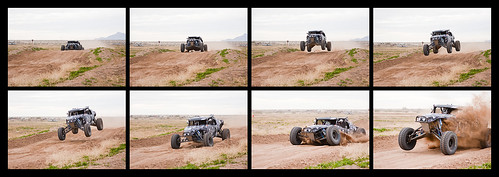
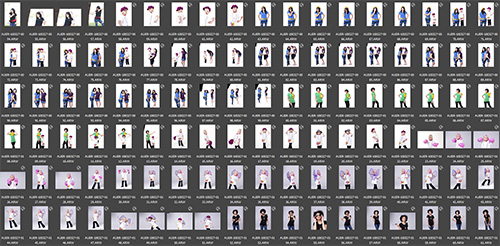
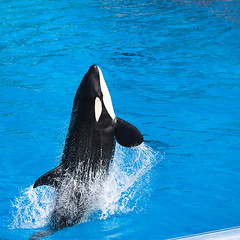


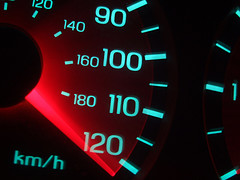
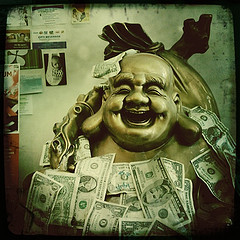
Sino
April 7, 2010As a long time film advocate, I’ll have to agree with your points.
I see (and use) film and digital as two different tools.
That being said, point 5, the cost of shooting film that is, doesn’t really stand when you’re just starting photography. It’s a lot cheaper to buy an old, packed with features analog camera, some FOMA film, an enlarger and chemicals, than it is to buy Canon’s/Nikon’s latest DSLR, or even most of the P&Sers that are around and a laptop.
That assumes you don’t already have a PC though!
Andrea McLaughlin
April 7, 2010Digital photography is perfect for a situation where you know beforehand that you will be doing lots of retouching on the final images. Senior portraits for example or professional headshots are two places where a photographer is expected to provide retouching as part of the job.
Free the Pixel
April 8, 2010One thing I really apreciate about digital is the possibiliy to shoot in RAW. This allows so much enhancements (exposure correction, defringing etc.) and creative editing which I would not like to miss. As Andra said, editing the images is much easier when shooting digital. Scans from film are mostly 8bit jpegs, not much room for enhancement there.
Of course film is still great and fun to deal with!
Sean Galbraith
April 8, 20106 When you’re just starting out
Film can’t compete with the immediacy of digital when you’re learning what all the settings do. What does aperture means re depth of field? Change a setting and you have your answer right away.
Jan
April 8, 2010One that you didn’t mention: Shooting tethered. Some shoots are intricate enough in lighting that you need to iterate. Shooting tethered can make that a lot easier than using a polaroid.
That said, you can (and I do) shoot mixed. Shoot digital until you have it all dialed in, and then take the final exposure in film, assuming you know how the two will compare.
Another one that comes to mind: HDR photography. Again, can be done with film, but is a lot easier digitally.
Regarding some of the comments: the retouching argument doesn’t totally stand. If you have a good post-process workflow with film you absolutely have the same control. In fact with a good scanner it’s easier and more cost-effective to get a true 16-bit file with higher resolution than you can obtain from digital (unless you have a really expensive digital back rig). So for real high-end work I would actually go with film for that very reason.
Peter Collins
April 8, 2010I shoot both and love digital and film for their unique characteristics. One thing left out that goes along with changing ISO on the fly is white balance. Exactly as you mentioned: one minute you’re shooting daylight, the next tungsten, then flourescent, etc.
Great article.
Samar
April 8, 2010I will have to agree with you but still medium format film works best for me, at least till I can afford a Digital Medium Format!
Jurripie
April 9, 2010Extra low ligh and no possibility for flash. Modern digital cameras can do ISO 3200 or even 6400 at level of noise that in even remotely impossible with any color film at same ISO. Usable pictures if you have no choise.
Andrew Boyd
April 9, 2010The money, the money, the money! The money is HUGE. Digital has been such an incredible game-changer for all photographers from an economic standpoint. A simple day-long commercial shoot could easily cost hundreds of dollars in film, processing and Polaroid costs…all those expenses are gone, out the window now. Less expense=better cash flow for the photographer.
Andrew
TheDiscerningPhotographer
David Ward
April 26, 2010After shooting in film on a Nikon F80 for a couple of months, I have to agree with the sentiments in this article. I have been a bit disappointed with my print film images, so far. Some of this may be due to poor lab processing – but I can’t really tell until I switch labs. Also, the thing that gets me is not knowing what I have captured until I have the roll developed. At which point it is usually too late to re-shoot the image.
My dilemma is now: to buy a high-end film scanner, so I can do better quality post-production and resolve the exposure issues; or purchase a DSLR. I know I saved a lot of money when I bought my film SLR and lenses, compared to buying a new DSLR. But even with my old p&s I can shoot as many shots as I like and (dare I say it) some of those shots are better than my SLR images.
I suppose I should just shoot a lot more in film and hang the cost of stock and processing. That way I could take multiple versions of the same shot at different exposures and just use the best one. Or am I missing the point of film?
I don’t regret moving from p&s to SLR – the use of different lenses and DOF control is significantly better. But i fear I may end up leaving the SLR at home and taking my p&s out more. BTW my p&s is a Sony DSC-H1, not a bad camera at all. It just has very limited DOF characteristics, due to the small sensor; and the narrow aperture range of the lens.
Larry Lubell
May 14, 2010This is a letter I wrote to Ms Goodman at Kodak.
[email protected]
Message: Dear Ms, Goodman,
I do have a 18 MP CMOS Digital SLR; so I understand the role that digital equipment can play in a 21st century, Facebook, Newsletter, and web based world. But imagine a world where Microsoft “Paint” replaced “Oil Paints”
Where a person, hand on a mouse, was a substitute for an artist with a brush in one hand, a palette in the other.
For all the ever improving quality of Digital, Film still has a magic. We might live in a digital world, but “People” are still analog. The Music industry switched form analog to digital, and in the end destroyed their industry.
I fully understand the desire to build a medical scanner with a higher resolution, such equipment has the ability to save lives. I appreciate the every increasing number of MPs can have an important use.
I also under stand that Ansel Adams and Henri Cartie-Bresson’s work needed no improvement. And no digital technology has allowed photographers to take better photos.
Film is Eastman’s legacy. For Kodak to stop selling film would be as silly as Coca-Cola to stop making Coke and come out with called “COKE II ” ( Oh yea, they did that, it was a mistake)
Please continue to sell film.
Larry Lubell
https://lubellphotography.blogspot.com/
__________________________________________________________
Here is Ms Goodman’s response:
Greetings Mr. Lubell:
We received your email and appreciate the opportunity to respond.
Kodak is serious about feedback like yours and we act on it when we can. Your current comments are going to be seen by the right people and you can rest assured your voice has been heard.
Sincerely,
Deborah Coles
Senior Customer Relations Specialist
Worldwide Customer Care
Eastman Kodak Company
[email protected]